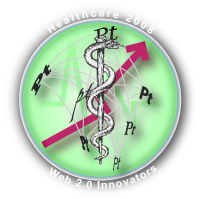New Life Sciences Accelerator Leverages Digital Social Network, Inspired by LinkedIn and Facebook
 Healthcare systems worldwide are criticized for falling short of expectations, and countries like the U.S. which feature aging populations, are rapidly approaching a crisis. Demand and cost will grow, but the system as currently structured will certainly break down unless radical changes are made. Web 2.0’s disruptive potential can be part of the remedy: we need to introduce much more accountability and collaboration into all parts of the system. We need to change the paternalistic attitudes that pervade the system, treat patients as active participants and encourage everyone to be more accountable. This series introduces healthcare Web 2.0 innovators.
Healthcare systems worldwide are criticized for falling short of expectations, and countries like the U.S. which feature aging populations, are rapidly approaching a crisis. Demand and cost will grow, but the system as currently structured will certainly break down unless radical changes are made. Web 2.0’s disruptive potential can be part of the remedy: we need to introduce much more accountability and collaboration into all parts of the system. We need to change the paternalistic attitudes that pervade the system, treat patients as active participants and encourage everyone to be more accountable. This series introduces healthcare Web 2.0 innovators.
Business Drivers
The Hershey Center for Applied Research KnowledgeMesh is a new initiative that unites healthcare- and life sciences-focused commercial, academic and government forces in a digital social network. It is a cutting edge social networking and scientific mapping online community that will drive R&D in the life sciences and high tech.
KnowledgeMesh is inspired by Facebook and business executive social network LinkedIn. It is explicitly designed to create and enhance interactions among industry, government, academie, venture capitalists, intellectual property attorneys and the work force.
Summary of Web 2.0 Activities
 How It Works
How It Works
The business plan resembles an incubator’s. KnowledgeMesh offers clients “Technology Suite” workspaces, but the real differentiation is the connections that “The Mesh” facilitates. Whether commercial, academic or government, ventures benefit from the connections and resources that it brings to the table.
One its supporters is the Life Sciences Greenhouse of Central Pennsylvania, which provides start-up money and support services to early stage life sciences companies.
Crossing Boundaries
Although incubators and accelerators have existed from time immortal, the difference here is the strategy to use digital social networks and Web 2.0 tools as a competitive advantage. The Mesh partnered with Intelmarx, which specializes in building social networks for nonprofit and higher education clients.
They have pursued a “LinkedIn look,” which enables people to share information and tools to enable people to connect spontaneously based on shared interests. Moreover, the environment also includes blogs, wikis and social bookmarking and tagging as well as chat via members’ profiles.
In addition to connections and world-class facilities, HCAR KnowledgeMesh provides wet and dry lab facilities and office space on its campus. It helps resident ventures get connected to appropriate people and resources relevant to medical discovery, development and commercialization at Penn State Medical School and nearby venture capitalists and other facilitators.
Lessons Learned
- Executive Director Laura Butcher was inspired by Simon Revell’s pioneering work introducing social networking at Pfizer, so she asked him to keynote the launch event in May 2008. Revell remarked, “If we could utilize some of these collaboration technologies, it would enable folk like myself to contribute event though I’m not physically sitting in there where these projects are being managed.” Cross-boundary collaboration.
- KnowledgeMesh is user-driven and is designed to grow organically. Its (online) research communities are focused on research areas such as: nanotechnology, clean technology, oncology and others, and it houses people from around the world.

[…] post HCAR KnowledgeMesh: Healthcare Web 2.0 Innovator Case Study appeared first on Christopher S. Rollyson and […]